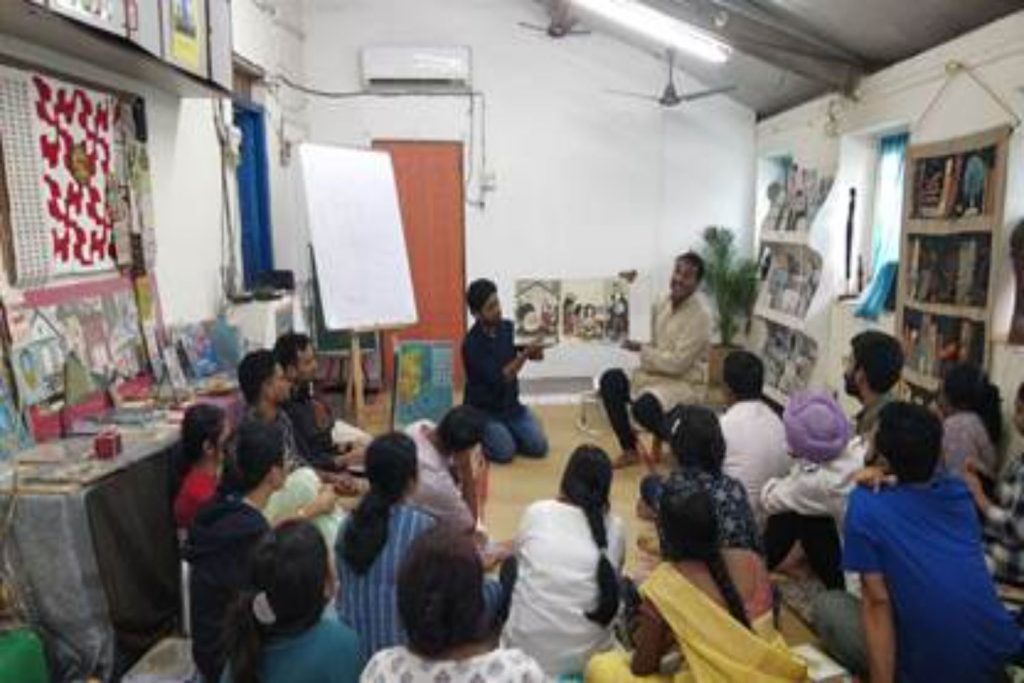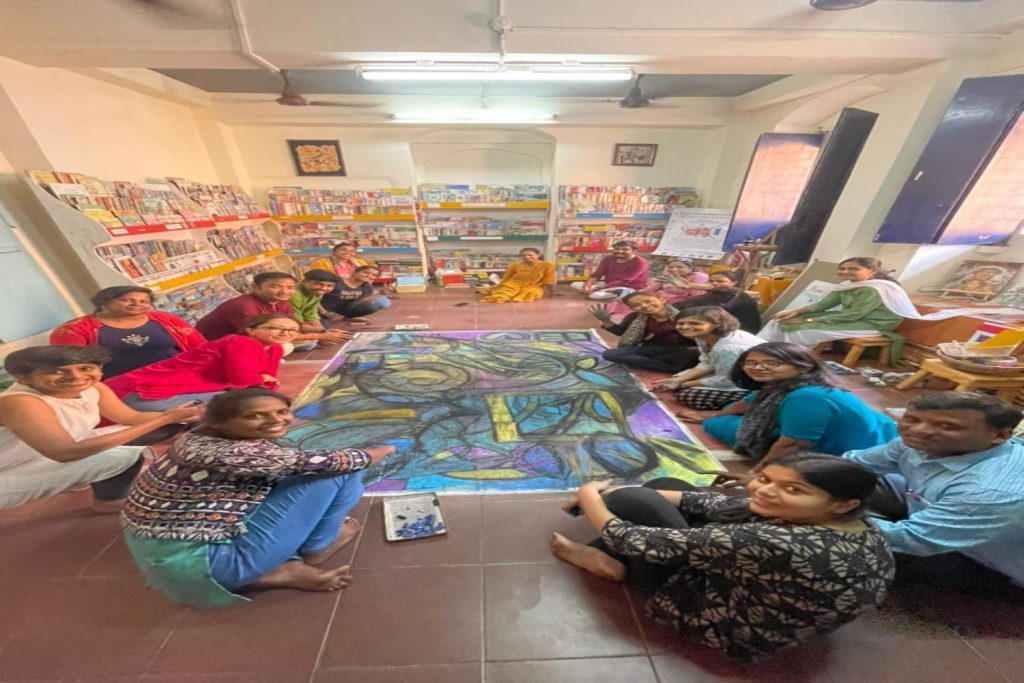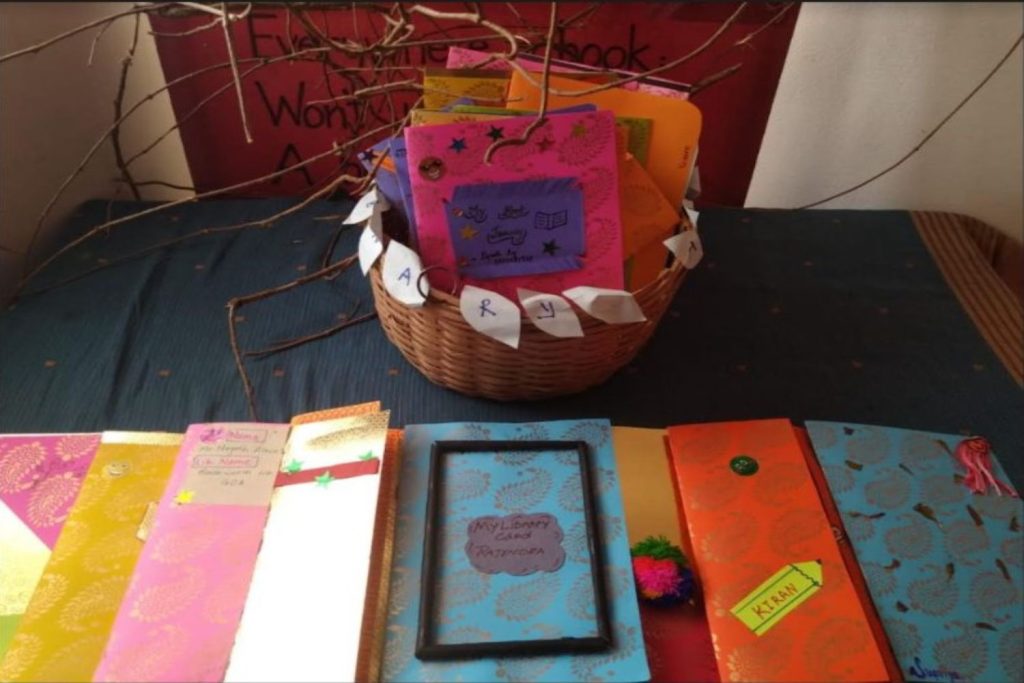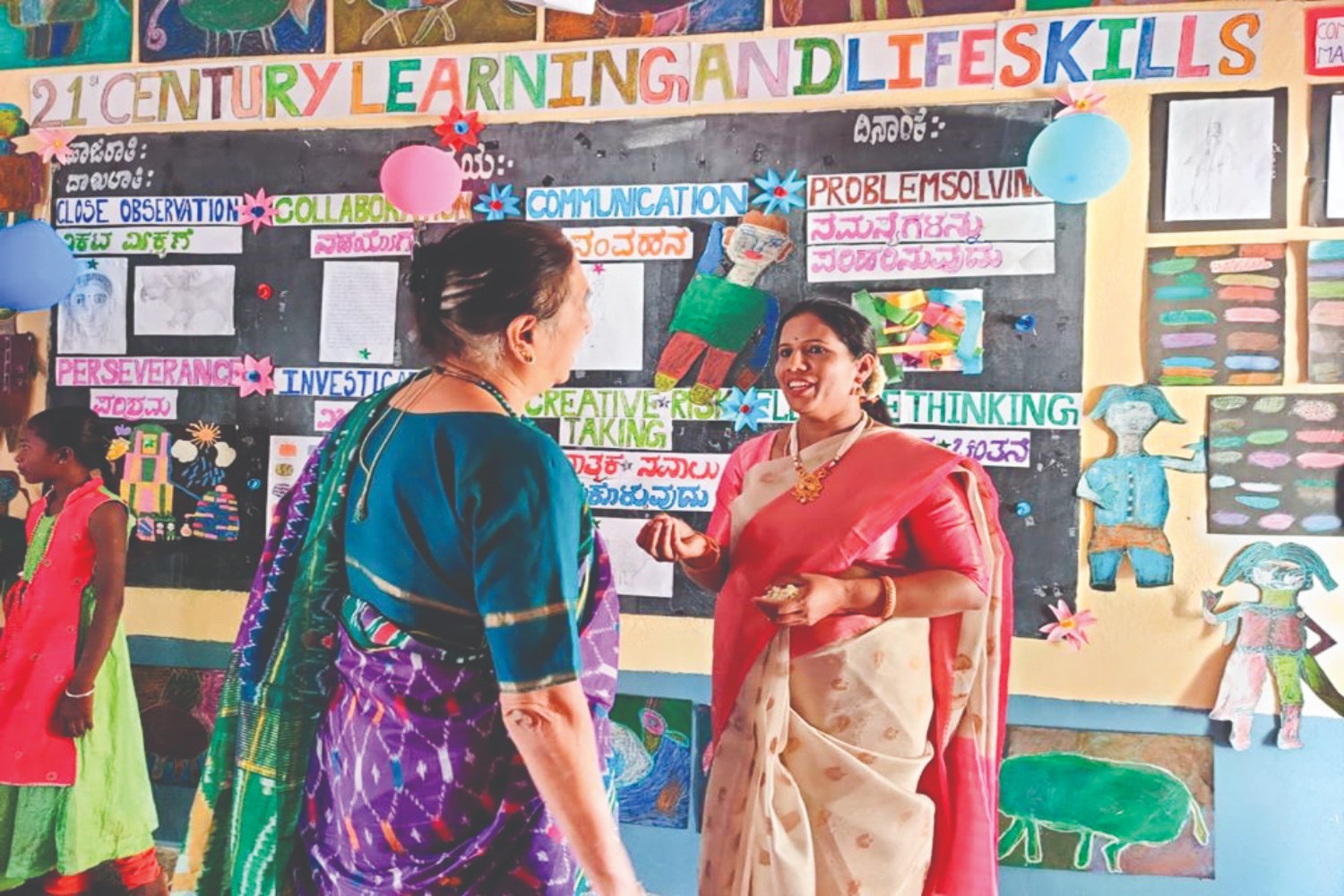Professional development in the library
In “Professional development in the library”, Anandita Rao shares the experiences of her organization in running courses for other CSOs in which observation and practice are critical components.

Most adults who come to a professional development offering on libraries at Bookworm, carry with them some notions about libraries. We all do. These notions, simply stated, include the idea of a space, books, and an exchange of books. After experiencing the possibilities of library work through a capacity building offering, responses read like this…
A library is…
“Dynamic, it is living. It can shape shift!’
‘A community space where both children and adults actively participate.’
‘A place where there are books, through which we can travel the world. It helps us hone our art. It is also a place where we can feel safe and happy.’
‘A happy place between teachers and students.’
“It is a space that gives without saying. It is a space with jaan (life).”
What enables these shifts?
In 2018, Bookworm was invited by Wipro Foundation to develop a short-term offering. Its goal was to enable organizations working in the field of education with children to experience ‘the why’ of libraries. Another of its aims was also to help think about what one can do to change the practice of libraries in one’s own work.

The macro vision has been to stimulate and support library work as an active mode of learning. This vision is inclusive of all children, both within formal systems and without. At the micro-level, the vision has been to engage educators and development sector entrepreneurs into spring-boarding their library practice within their own work contexts.
The course titled ‘Introduction to libraries’ has been a result of this process. It is a twopart workshop. It is facilitated over three months.
Part one is held in-person. After this, the participants are expected to plan and conduct a library activity project over six to eight sessions with children. This is the practice component of the workshop.
The workshop’s second part has been explored both as a physical contact and a virtual contact in varied iterations. The contact period is designed to open elements of a children’s library and library work. This includes aspects such as people, spaces, collection, engagement, administration, interaction and values.
We intentionally host the workshop at the Bookworm library. This allows the participants to experience this library space. It gives them a hands-on feel of what creating, and engaging with, a living, breathing and thriving library space means.
One of the primary objectives of the ‘Introduction to Libraries’ workshop is to introduce the idea of a library. We envisage this physically as an embodied experience through our bodies and emotions. We also co-visualize this conceptually through ideas, texts and sessions.
We hope to disrupt the current conventional understanding of libraries as a severe storehouse of books. The goal is the communication and co-creation of an open vision of a living breathing library, where users feel safe and joyful, read and share, and also experience ideas both challenging and beautiful.
Another objective of the workshop has been to open theoretical aspects of a children’s library along with practices and activities. Many participants share that they used to read a few books per year. However, through this workshop exposure and access to a rich collection, they now feel encouraged to read. They are beginning to see stories as an extension of human lives, as communications between one human being with another.
Voices from the workshop
We share here the feedback by participants of the “Introduction to libraries” workshops at Bookworm. They share their experiences and reflections in their own words.
“I have come to see libraries as creative, collaborative spaces that have potential to meet diverse objectives and needs. There is also renewed respect and value for professionals and educators working in the library space.” – Participant from the cohort of 2022.
“On entering I was touched by the simplicity which got reflected in the space, the people and the participants.” – Participant from the cohort of 2023
“The Book Talks really opened up an emotional window to books. The library and the collection itself were a treasure trove.” – Participant from the cohort of 2021
“The workshop has expanded the meaning and possibility of what a library can be.” – Participant from the cohort of 2019
“How to keep the library alive forever? How to create a lovely relationship between children and the library through games? How to do teamwork? How to create a lively atmosphere, by adding small things to the library? How to create different types of books for children of different ages in a better way? I have learnt many activities and many things by watching you. That’s it.” – Participant from the cohort of 2024
“After the experience of the Library Activity and receiving feedback from peers and library educators at Bookworm, I see many windows of learning open up, including the inherent value of a library.” – Participant from the cohort of 2022
“I knew that we could know ourselves through books. However, I didn’t know that the library can be so effective in connecting with small children and their parents. This was revealed in the Saligao library when I saw parents and small children knowing and understanding each other through books. This happened only when we went to the Saligao library for an exposure visit.” – Participant from the cohort of 2024
“As you walk into and spend time in a library’s embrace, I invite you to fill in the blanks. A library is like a _.” – From the cohort of 2022
The selection of participants for the workshop has been a fluid process. Over the years, a percentage of the participants who come for the workshop are engaged with work whose core focus is the library. Hence, the workshop is an opportunity for these participants to explore what they may want to do, and what direction they would like their work to take.
The participants’ diversity adds a lot of value to the discussions and conversations in the workshop. Everything comes from real experiences and practices. This also pushes us and our team to think and deepen our work with children. In our own work, we have experienced how our ability to understand and articulate the why of the work we are doing plays a critical role in our own ownership and ability to prepare, plan and execute, in ways that are genuine and contextual.
Emily Ford in her paper on “What do we do and why do we do it?” shares this need explicitly: “When every library worker engages daily with the question, ‘What do I do and why do I do it?’ we will be better situated to have meaningful conversations with one another. We will be able to better articulate amongst ourselves our goals and our missions. We will have a deeper understanding of the societal benefit we provide, and we will better position ourselves when external conversations occur.”
Workshops at Bookworm are experiential. Experiencing a practice, an idea, a thought that is being conveyed, tends to seed this in ways that only listening cannot. The act of learning being a multimodal one applies to adults too.
In interactions with schools, an act that has supported relationship building has been school heads and teachers experiencing that the library is filled with possibilities to enhance literacy, learning and critical thinking. This has allowed the adults to first experience the possibilities of the library, and be convinced of the role it could play in children’s lives.
Taking back aspects of learning to practice in one’s own work context with children has been the anchor of our interventions. This has also been a core part of the workshop design process. The act of exploring a learning in practice with children’s grounds the learning. It makes the process meaningful and not limited to one’s own experience of it, or to the theory of it.

In our first offering in 2018, we began with 20 participants who attended the workshop’s first part. It closed with 13 participants who worked on the challenge of implementing one idea from the workshop, into library practice with children. For several participants, especially those who do not work directly with children, this act of taking an idea into practice has been challenging.
We also realized as a resource organization that our own support through the distant period needs to change. In 2023, through a framework of ‘Gradual Release of Responsibility’, participants were closely supported in the initial phase of their library activity. It was scaffolded in a way that they could then independently work on their activities.
The design of the ‘Introduction to libraries’ workshop has changed with the learnings that we have absorbed as a team. A shift in recent years has been to include time in the contact for direct observations of sessions with children.
Bookworm’s library work is active across schools and communities, and through different models of engagement. For many participants the opportunity to observe a library session in progress with children, and directly experience the joys and challenges of this, has been a concrete part of learning.
In our last offering, the contact also included a Library Mela. Here the participants could directly engage with children in the field. They could also reflect on how the engagement went and what they could do differently in the future.
A learning that we have come to, as we continue this journey of professional development, is that ideas take time to transfer into practice. Practices also take time to seed. Changes at the organizational level need sustained mentoring. In several cases, founders of organizations have first participated and experienced the possibility of the library through this offering. They then recommended other team members to also participate in the same.
Some individuals and organizations have continued to invest in training and learning through varied opportunities. This has taken place through participation in long-term courses, online workshops and sessions, and being supported when faced with dilemmas. In the process, they have demonstrated that professional development is a continuous process and needs consistent interactions.
Our journey with Kalpakta Education Foundation, (founded by Tolesh Borkar and Sachin Dekate), began in 2020 during the pandemic. Tolesh reached out for guidance in activating a library for the children in the community of Sirsi.

A glimpse of changes and learnings across the years
As we close the 7th offering of the workshop on ‘Introduction to Libraries’, a glimpse of the learnings across the years are shared here.
Selection: For many workshops, participation by the founder and a practitioner from the team has ensured that what is absorbed through the workshop is implemented within each organization’s work in meaningful ways. This ensures that there is meaning making through the library work at an organizational level, and not just in terms of activities.
Furthermore, organizations who recognize the value of this capacity building also often choose to nominate additional team members to participate in the workshop. This helps multiple team members to share the learnings and experiences with the others. This ends up developing a shared sense of understanding of library work.
Pre-workshop engagement: During 2020, in collaboration with Wipro Foundation, Bookworm developed an online open self-paced course, Libraries: Chapter One (In English and Hindi). The course is an introductory course to libraries, and their place and importance in the community.
Each participant is requested to complete the first module of the online course, that responds and opens up the question of ‘Why libraries’. This module has helped participants of the ‘Introduction to Libraries workshop’ to come into the workshop with a shared context of what the workshop may entail. We recognize that this is an important pre-engagement.
Learning through observation: In addition to experiential and teaching sessions, incorporating observations and the opportunity to practice and receive feedback into the design of workshops have been welcome changes. Many alumni share that observing the Bookworm team in library practice with children has helped them note and understand some of the nuances of how one could engage through the library.
Learning as we teach: Through the opportunity to offer this workshop each year, the Bookworm team’s own practice and skill of capacity building, have grown over the years. In this space of cross-sharing and learning from the experience of so many practitioners across the country, our own learning takes root in wider and deeper ways.
In 2021, Tolesh and a co-team member, participated in the ‘Introduction to libraries’ workshop. Since then, two other team members have attended the workshop in the subsequent years. They have also been a part of other professional development offerings that Bookworm holds.
Tolesh shares, “Library work extends beyond storytelling and book issuing. It requires a deep understanding of library operations, activities and purposes. To excel, library teams need ongoing capacity building and professional development. We are fortunate to come across Bookworm Library’s comprehensive training programs. These include ‘Introduction to library’, ‘Library mentoring support (LMS)’, ‘Critical literacy’ and ‘Library educators certificate (LEC)’ course. These courses foster a deeper understanding of library work and enhance the knowledge and skills of team members.”

Revathi, is the founder of Vanavil. The CSO was started in 2005, to support the children of two nomadic communities in Tamil Nadu. Revathi and Mithra attended the ‘Introduction to libraries’ workshop in 2023. Since then, libraries have been activated in different ways in Vanavil’s school, and in the community centers that Vanavil runs. In addition to this workshop, the Vanavil team have also been a part of Bookworm’s other professional development offerings.
Revathi says, “As the founder was an avid reader, books were an important part of the Vanavil pedagogy. However, since regular textbooks were far removed from anything the school was grappling with, storybooks and picture books were used as the only texts in the initial days. We had access to some good children’s books. We used them in a random and unplanned manner. In January 2023, when we went to the Bookworm Library for the ‘Introduction to libraries’ workshop, a library existed in our school. However, since then (over a period of 18 months), our library has come alive and has taken on a personality of its own.”
In both the above cases, the organizations began their library professional development journeys through the ‘Introduction to libraries’ workshop. They have continued this journey through engagements with further professional development opportunities. We recognize this trust and desire to deepen practice as a key factor in strengthening capacity building.

Over the years, the workshop content and our own learning have grown and been shaped by changes on the field, and through our interactions with children. Since the scope of every workshop offering is based on direct library practice with children, we grow as facilitators through our library practice with children, and our own experiences of what is possible in a library space.
Note: This article is written by Anandita Rao, with inputs from the Bookworm team. Bookworm, as a resource organization, offers several library professional development programs. These include the ‘Library educators certificate’ course, the ‘Library mentoring support’ program, the ‘Library: purpose and practice’ workshops, and the ‘Critical literacy’ workshops, amongst others.



No approved comments yet. Be the first to comment!